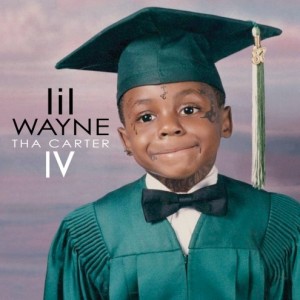 Reviews have been tepid for Lil Wayne’s Tha Carter IV, but in its first week, it sold 964,000 digital and physical albums combined. Those numbers are just shy of opening week sales for Tha Carter III, and the 300,000 digital units sold in the first four days was a record for iTunes. That record was set just weeks after Jay-Z and Kanye West broke the previous record with the release of their Watch the Throne collaboration. It’s total opening week sales, though, were 436,000 units, less than half of Lil Wayne’s first week sales.
Reviews have been tepid for Lil Wayne’s Tha Carter IV, but in its first week, it sold 964,000 digital and physical albums combined. Those numbers are just shy of opening week sales for Tha Carter III, and the 300,000 digital units sold in the first four days was a record for iTunes. That record was set just weeks after Jay-Z and Kanye West broke the previous record with the release of their Watch the Throne collaboration. It’s total opening week sales, though, were 436,000 units, less than half of Lil Wayne’s first week sales.
Digital sales of Tha Carter IV are not, however, the largest opening week digital sales of the year. That honor so far goes to Lady Gaga’s Born This Way, which sold 1.1 million copies. That number came at a remarkable cost to Amazon, which discounted the album to 99 cents to help draw attention to its then-new cloud service.
Reviews of the album have been mixed—not weak, but not Tha Carter III or Lil Wayne at his peak. At RollingStone.com, Rob Sheffield remains entertained by his nuttiness:
Weezy doesn’t have the same speed-demon intensity he had five years ago—and he’s just as casual and sloppy about his approach to official album releases. So Tha Carter IV has experiments that fail, as well as a pair of star-studded guest tracks where Wayne doesn’t appear at all. (Though Andre 3000 is great in “Interlude.”) Yet even the failed moments sound like nobody else—check out “It’s Good,” with its threat to kidnap Beyoncé so Jay-Z can pay the ransom money. That’s impressively tasteless, if nothing else. And the music is sampled from the Alan Parsons Project’s 1976 prog-rock opus Tales of Mystery and Imagination, which is just plain insane.
At The New York Times, Jon Caramanica is confused by the album:
In retrospect, Lil Wayne’s dizzying mixtape output from 2006 to 2007, when he was at his most bizarre, most confusing and most prolific, set an almost impossible standard, one that he has failed to live up to for the last couple of years.
Tha Carter IV shows off those flaws, highlights them even, if only because everyone is looking so closely. On a handful of songs, particularly “President Carter” and “Megaman,” he raps as if something were still at stake. He can still toss off a neat double entendre (“I ain’t working with a full deck/But I deal,” on “It’s Good”) or a hilarious left-field insult (“You’re dead to me, brown grass,” he raps on “President Carter,” which amusingly samples the inauguration of Jimmy Carter), but mainly, this is Lil Wayne at his laziest or most uninterested.
Greg Kot at The Chicago Tribune is similarly frustrated:
The years-in-the-making Tha Carter IV (Universal Motown/Cash Money) is designed to restore Lil Wayne’s reputation, but it falls short. At his best, Wayne was positively psychedelic in his wordplay, capable of creating entire alternative worlds out of a few surrealist metaphors. But he sounds slower, more methodical, less unhinged on Tha Carter IV. His flights of fancy still pop up occasionally, whether likening MCs to tiramisu and shortbread in “President Carter,” declaring that “real G’s move in silence like lasagna” in “6 Foot 7 Foot” or contemplating the clouds buried in his fingernails on “Nightmares of the Bottom.” But they’re not nearly as plentiful or sustained as on his best albums.
Jeff Weiss groans over the bad jokes and sub-par lines at The Los Angeles Times:
Throughout the Wayne’s ninth solo album, the idiosyncratic drugged-out loon of his 2005-07 zenith is similarly AWOL. Gone is the purple-sipping and chronic-smoking satyr that slurred about being so high he could eat a star. The stream-of-consciousness id that Iggy Pop might once have envied is still on display, but here it feels corralled into a pen of predictable similes and metaphors.




